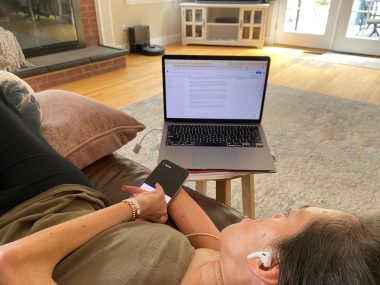My Most Comfortable Position Makes Me Feel Uncomfortable


Before I began writing today’s column, I recorded video interviews for a rather well-known brand here in the United States, focusing on my role as chief creative officer at an adaptive fashion company. While I don’t necessarily love public speaking, the larger issue at hand is often finding a comfortable position to speak well in.
Living with SMA, I think I speak on behalf of everyone when I say positioning is important — and getting it just right is crucial. Precision is key. If the precision is off, it causes a domino effect of other issues, such as pain, trouble breathing, inability to use certain muscles, and difficulty doing tasks that involve physical activity.
If my arm isn’t placed just right, I can’t type these columns — or work at all, for that matter. If my neck isn’t stretched to the exact location I feel comfortable in, I will be in pain. If my hands aren’t perfectly stacked in the right position with my fingers stretched out, I can’t drive my wheelchair. You get the gist.
Oftentimes, though, my most comfortable position is lying down. It’s what I’m doing right now to write. My left arm is placed across my torso to type on my iPhone that’s resting on my right arm. This position works well for me. However, I have to say things like, “Just a tad to the left” and “Nope, now to the right” six or seven times before I’m comfortable and able to do the task at hand.

Alyssa writes this column. (Courtesy of Alyssa Silva)
In this position, I don’t experience pain like I do when I’m sitting in my wheelchair. I’m able to use my arm more easily. And it takes less energy out of me than sitting up does. However, it’s also the position I’m most self-conscious in.
When it comes to work meetings or, in today’s instance, video interviews, I have to take them lying down. In the past couple of years, it’s become increasingly difficult to talk for a long period of time in my wheelchair. Lying down makes much more sense for me. But when I meet with large companies (I once met with British Vogue lying down), I let my nerves get the best of me.
Do they think I’m being lazy? Are they deeming me incapable because they see me lying down? Will they take me seriously?
These are some of the thoughts that go through my head before getting on camera. If I have a point of contact, I’ll reach out ahead of time to explain my situation, which gives me more confidence. I sometimes wish it were different, though.
During today’s videos, I kept tripping over my words, having to retake the footage while fighting against self-consciousness. Filming someone speaking in that position is awkward to begin with. Thinking about my co-workers filming their parts sitting up, hair cascading down, and looking poised only adds to my awkwardness. At least, that’s what my brain tells me. Unfortunately, there’s no other way to go about it.
During times like these, I have to remind myself I’m fortunate to have such opportunities despite my circumstances. I know that more likely than not, my negative self-talk is me getting in my own way. I know that if it weren’t for this position that I feel comfortable in, I wouldn’t be able to work or record these videos at all. And I know my voice matters. So, I push through the self-consciousness and do it anyway.
Note: SMA News Today is strictly a news and information website about the disease. It does not provide medical advice, diagnosis, or treatment. This content is not intended to be a substitute for professional medical advice, diagnosis, or treatment. Always seek the advice of your physician or other qualified health provider with any questions you may have regarding a medical condition. Never disregard professional medical advice or delay in seeking it because of something you have read on this website. The opinions expressed in this column are not those of SMA News Today or its parent company, BioNews, and are intended to spark discussion about issues pertaining to spinal muscular atrophy.
The post My Most Comfortable Position Makes Me Feel Uncomfortable appeared first on SMA News Today.




